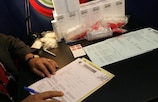EURO anti-doping drive in full swing
Wednesday, June 8, 2016
Article summary
UEFA’s comprehensive anti-doping programme for UEFA EURO 2016 is the largest to be conducted so far at a UEFA EURO tournament, and moves into top gear with this week's kick-off.
Article top media content

Article body
UEFA's ambitious anti-doping programme for UEFA EURO 2016 moves into an even higher gear with the tournament kick-off on Friday – and the expanded 24-team format in France makes the programme the largest to be conducted so far at a UEFA European Championship.
UEFA EURO 2016 will see the further evolution of UEFA's anti-doping work, featuring extensive out-of-competition testing, in-competition tests at every match and targeted testing based on intelligence and knowledge-sharing.
Since January 2016, UEFA has been working very closely with the national anti-doping agencies (NADOs) of the participating nations, in order to implement the best possible testing programme in the run-up to the finals. To achieve this, UEFA has signed cooperation agreements with 23 European NADOs so far.
Thanks to those agreements and by sharing information, intelligence and whereabouts, UEFA has been able to coordinate the out-of-competition testing programme of the participating teams as from January 2016.
By using ADAMS, the World Anti-Doping Agency (WADA) database, to store and exchange testing data with all anti-doping stakeholders, UEFA can see how many tests in total – at both international and domestic level – have been conducted on the EURO players since January 2014. With this information, UEFA has been in a position to balance its testing plan by looking at the teams and players which are less tested than others.
Some 1,278 out-of-competition samples, including urine, serum and blood samples, have been collected from EURO players who gathered with their national teams during the international week of friendly matches in March, as well as in the immediate pre-tournament period at the end of May and beginning of June.
In addition, many more samples were collected from the EURO players when they were tested by their NADOs in domestic competitions, and by UEFA if they were participating in the UEFA Champions League and UEFA Europa League. For those two club competitions, UEFA took 874 samples (502 samples out of competition and 372 samples in competition) from January onwards.
From 1 June, 552 EURO final squad players – 23 from each country – have remained in the UEFA testing pool. The event period for in-competition tests started on 5 June and finishes on 11 July, the day after the EURO final.
At least two players per team will be selected to provide blood, serum and urine samples at all 51 EURO matches. Players and teams may also be subject to target testing between games. Twenty experienced doping control officers (DCOs) have been chosen to carry out the tests.
The team doctors of all 24 EURO participants came together in Paris in March to emphasise their support for UEFA's anti-doping rules and requirements for the event. The doctors signed a EURO anti-doping charter pledging to help UEFA achieve a drug-free final tournament, and to take all necessary steps to help UEFA reach its objectives
The 2015/16 season has seen the successful introduction by UEFA of a new steroid and blood profiling programme. UEFA's new programme helps create biological passport profiles for players. The Athlete Biological Passport (ABP) will monitor players over time, and indirectly reveal the effects of doping as a result, as well as providing intelligence for target testing. This is seen as a significant deterrent to any player who might consider taking banned steroids.
In another deterrent measure, UEFA has also introduced a long-term sample storage programme. Samples from the EURO and the major club competitions will be stored for a minimum four years, which means UEFA will be in a position to reanalyse any samples when required due to intelligence received or new analytical techniques becoming available.






